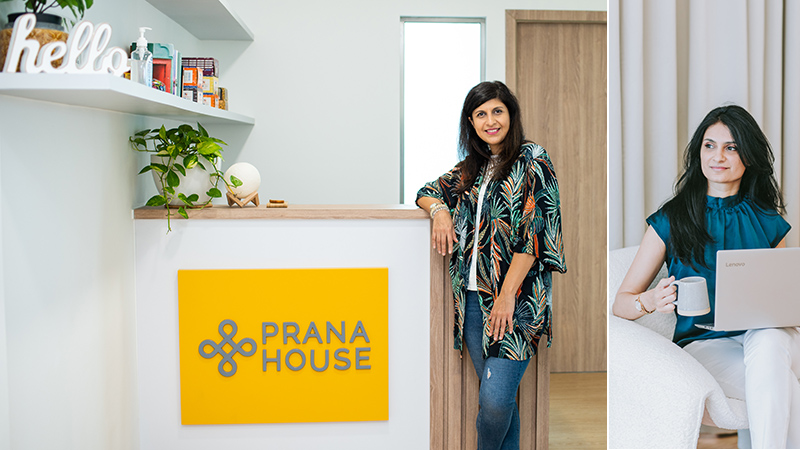Last year, Zerodha co-founder Nithin Kamath created quite a stir when he shared a startling statistic on X: only 0.2 per cent of the Indian population (around 50 lakh people) are engaged in organised fitness routines — like going to the gym. He added, “Most Indians think that you don’t need strength training as you age. The truth is strength training becomes even more critical as we get older, especially after our 40s. The stronger we are, the more active we can be when we are older.”
Dubai-based Gitanjali Diwan and Rupali Tanna Jaiswal, who teamed up to launch Prana House — a holistic wellness centre housed in Motor City — however have a happier, and fitter, story to tell about non-resident Indians in the UAE. “According to our research, 43% of Indians in the UAE are now prioritising their health, with an increase in people shifting to yoga, healthy eating, and fitness routines not just for the way they look externally but also how peaceful and confident they feel internally… While staying consistent is still a challenge, the growing trend is clear: the Indian community is increasingly embracing long-term well-being over short-term indulgence from this year compared to the previous years and it’s just growing more and more.”
Gitanjali and Rupali are both former corporate honchos, whose paths first crossed in 2021, while they were attending a Reiki course. As they became friends and chatted more and more about their passion, they realized there was a gap in the perceived-to-be-overcrowded market: a space that welcomes newly-qualified practitioners while emphasizing a sense of community. Prana House was the result — after the two obtained requisite trainings and certifications.
Edited excerpts from an interview to NRIFocus:
Q: What are your observations about the evolving NRI community in the UAE vis-à-vis fitness and wellbeing?
A: They are increasingly adopting a holistic approach to fitness and wellbeing, and moving beyond traditional physical fitness to embrace mental and emotional wellness. According to a 2023 Global Wellness report, the wellness economy in the UAE (where Indians constitute almost one-third of the population) is valued at over USD 3.8 billion, with mindfulness and mental wellbeing services growing rapidly. Participation in yoga and meditation has increased by 12% in yoga alone.
Wellness is now seen as a necessity, not a trend. NRIs, once primarily focused on career and family, are now shifting towards a more balanced lifestyle, prioritising holistic health practices that includes mindfulness, yoga, and meditation. The demand for wellness services that promote mental stability and stress reduction is growing rapidly.
This cultural shift is a clear indication that they are embracing wellness as a long-term, sustainable lifestyle, rather than just a temporary trend.
Most Indians have a bad rep of not taking fitness and wellness too seriously; they also find it difficult to stick to a proper diet — especially in a place like Dubai where it’s easy to overindulge, and stay indoors: how true is this statement?
It’s true that, historically, many Indians have not taken fitness and wellness as seriously as they should… often due to cultural habits and lifestyle. In cities like Dubai, maintaining a balanced diet and keeping up a fitness routine can be challenging, but there does seem to be a positive shift.
The key issue lies in the cultural perception of wellness. Many still consider fitness as an external appearance rather than overall health, and diet is often compromised due to social gatherings and rich, fast food. However, with increasing awareness and access to wellness services, perceptions are changing… for the better!
How important has social media been on your journey?
Platforms like Instagram, Facebook and YouTube have been invaluable tools in reaching people who might not have otherwise engaged with wellness practices. The ability to share educational content, client testimonials, and wellness tips has helped create a strong, engaged community around their brand. Moreover, the visibility of influencers and wellness experts on social media has helped normalise the conversation around mental health, mindfulness, and self-care, encouraging more people to prioritise their well-being.
Paid classes vs free YouTube tutorials: how will you convince a potential client one is better than the other at a time when social media influencers are coming up with catchy ways to convince you otherwise (“Follow me and see a difference in 2 weeks” type of lines)?
While free YouTube tutorials and influencer content can be a great introduction to wellness for beginners, we believe that paid classes offer far more value for those truly committed to their long-term well-being. Free content often lacks customisation and may not account for individual needs or limitations, whereas paid classes are designed to offer tailored support, proper techniques, and safety measures. Additionally, accountability and community support play a vital role in maintaining consistency, something free online content lacks.
Tell us about your association with the Dubai Fitness Challenge…
The Dubai Fitness Challenge has been a fantastic platform for us to introduce a wider audience to practices like yoga, meditation, and mindful movement. As part of the initiative, Prana House has been actively involved in offering wellness sessions, promoting the importance of holistic health, and encouraging Dubai’s residents to move beyond just physical fitness. However, the real challenge is ensuring that the momentum doesn’t fade once the 30-day challenge ends so we also emphasise that wellbeing is a lifestyle change, not just a 30-day fix. – Sushmita Bose is a consulting editor at NRIFocus.com


Leave a Reply